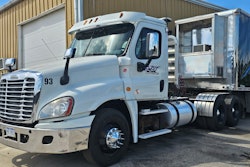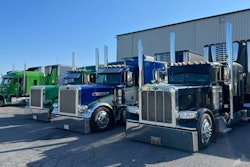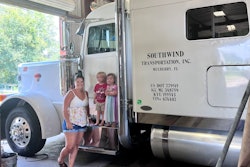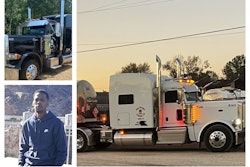 The all-Anthem fleet of Sacramento, California-based Virk Express, a Small Fleet Champ contender with a fresh take on produce hauling out West.Virk Express
The all-Anthem fleet of Sacramento, California-based Virk Express, a Small Fleet Champ contender with a fresh take on produce hauling out West.Virk Express
There's an iron law at the foundation of seven-truck reefer fleet Virk Express, based out of Sacramento, California: Do the job, get the pay. That goes for company drivers and owner-ops working with them as well as the dedicated customers who never saw the company waiver on price or quality throughout the pandemic and swear by Virk's service.
Owners Sunny Virk and Sam Singh spent years as company drivers, and became fast friends in an industry where the driver is too often ripped off.
"We both started as drivers right around 2010 or 2011," said Singh. "We were working for the same company here in California and it was good, but the company itself wasn’t handled very well."
Singh and Virk both bounced around a few companies out West looking for the ever-elusive perfect fit, staying friends throughout. "We struggled with a few companies where either the schedule wasn’t right or it just wasn’t paying us right," said Singh.
Finally, after one too many short checks, both had that ah-hah moment that kicks off so many an owner-operator's transition to independence.

"I was out $13,000-14,000" in 2016, said Virk. Singh, furthermore, "was out like $30,000 to $50,000." Under the pressure of significant losses and their own fire for self-improvement, the pair forged a bond and that iron rule that's bound them to this day.
"Our rule is don't scam anyone out of money," said Virk. "Hell or high water, pay the drivers for what they’re doing."
That rule shouldn't even need saying, but with brokered-freight markets in various states of disarray, and lean rates pushing companies to the edge, it doesn't just require saying, it's become a point of pride and key distinction for Virk Express, a semi-finalist in the 3-10-truck division of Overdrive's Small Fleet Championship.  Sam Singh, one half of the power duo that makes up Virk Express' leadership, never hesitates to get behind the wheel to meet a customer deadline.
Sam Singh, one half of the power duo that makes up Virk Express' leadership, never hesitates to get behind the wheel to meet a customer deadline.
Dependable service, fair dealing: Word gets around
Like many fleets, Virk mostly gained drivers and trucks by popular demand/word of mouth.
The pair kicked off independent operations hauling for Wada Farms, an operation mostly out of Idaho. The pair would haul potatoes from Idaho and Utah, with other produce making their way inland from the home base.
"We were running to Utah back in 2016-2017 for Wada Farms, who are pretty big and go all over U.S.," said Singh. Originally, Singh and Virk "ran into one of their freight brokers on the load board," but managed to make that all-important transition to cementing the relationship.
After about two or three weeks "with no incidents on the load, a higher-up lady called Sam and started talking about making this a regular type thing," said Virk. "Basically, she said 'I'm not going to argue with you guys about the rates, but these are all NorCal loads and I need all of your trucks.'"
What happened next: "Because we were running so well, people talk," said Singh. A fellow driver called and said he was interested in driving for Virk.
"But we don't really have drivers," Singh responded.
"Then go buy a truck and I'll drive for you guys," the driver said.
 This is one of several Small Fleet Champ semi-finalist profiles that will air through next week. (Access all of the published profiles via this link.) Two finalists in each category (3-10 trucks, 11-30 trucks) will be announced October 11.
This is one of several Small Fleet Champ semi-finalist profiles that will air through next week. (Access all of the published profiles via this link.) Two finalists in each category (3-10 trucks, 11-30 trucks) will be announced October 11.
[Related: Customer service, keen business sense drive Paul Rissler Transportation's longevity, success]
Rather than chase the high of adding more trucks and drivers, Singh and Virk focused on honing their operation.
About finding loads out to Idaho and Utah, Sing noted "we would just randomly pick up wherever." But once more trucks came online, they prospected for California customers and found Associated Foods. "They were like three miles from our yard -- no deadhead." The company inked a good deal hauling almond milk and the like out to Utah, and then bouncing back with more reefer freight.
Within a year they had hit a sweet spot. "We were getting dedicated loads from Idaho back to NorCal," said Singh. Eventually they got to about 80% dedicated out of Idaho with Wada and 80% dedicated out of NorCal with Associated Foods.
With California almonds a well-known commodity and Idaho potatoes a household name, Virk and Singh had the reefer game just about in a chokehold, but they live in California, after all, and the Golden State demanded its share of attention.
"California is a pain in the butt, highly over-regulated," said Singh.
[Related: California says it banned 230,000 trucks. What's next?]
"We spent almost $200,000 on a truck and it still has codes and faults and emissions problems," said Virk, who handles a lot of the maintenance needs for the all-Mack Anthem fleet. "You could move to Texas and buy a truck for $35,000 and make the same money. As soon as you leave California, you start seeing older trucks."
Virk and Singh have no shortage of pride in their fleet of Mack Anthems, but it all comes with a hefty price tag and plenty of work to do, too.
Virk sees a significant tradeoff buying newer trucks and trying to keep up with emissions issues -- "the longevity of these trucks isn't what it used to be," he said. "Maybe 700,000 or 800,000 miles, and after that just scrap it."
California in turn demands extensive documentation on all miles traveled and equipment used. IFTA accounting can catch an operation off-guard when the quarterly balancing is done. Virk noted a whopping $7,000 bill for IFTA last quarter, given very little fuel bought in California but plenty miles run there. "As soon as you cross the border" into another state, "it's a $2 difference" in price at the pump. He's done the math and can see the real cost of fuel is lower elsewhere.
Singh said he'd like to hire an office person or an accountant, but high taxes and other costs eliminate much wiggle room for that salary. Needless to say, Virk Express leadership spends a lot of time fantasizing about a move to Utah or Idaho, but even with the significant financial and regulatory burdens, they're making money, grossing close to $2 million in 2023 and banking plenty in net income.
The COVID gamble
Singh and Virk navigated the COVID pandemic with little more than their values and instincts and happily landed on top. That meant sticking with the dedicated customers that had supported them for years, and not gouging prices when annual contract renewals came up. For that, they suffered the slings and arrows of their trucking buddies.
"People were telling us we were dumb" for not chasing rates double, even triple historical norms in the crazy days of post-2020, said Singh. Even eyeing the bonanza rates on the spot market and government-subsidized cash grabs, Virk Express kept its eye on the prize.
"Other trucking companies took PPP loans, and every kind of loan they could to buy overpriced equipment," said Singh. Trucks sold for $350,000 in those days and no one batted an eye.
Singh and Virk were still about 20% on load boards, so they certainly cashed in on some of the rates inflation, "but we stuck with our regular people," Singh said. Fundamentally, that was the priority for long-term stability.
 Virk's Mack trucks would probably get better fuel mileage if their main routes didn't take them over Donner Pass and up and down mountains, but with a fleetwide average of 7.5 mpg, they're just happy to stay ahead of California's increasingly strict regs.
Virk's Mack trucks would probably get better fuel mileage if their main routes didn't take them over Donner Pass and up and down mountains, but with a fleetwide average of 7.5 mpg, they're just happy to stay ahead of California's increasingly strict regs.
To this day, that's had an impact. Kevin King, transportation coordinator at Wada Farms, "can't say enough good about" Virk Express. "I don't even know where to start," he said.
That's how you want your main customer to discuss your fleet, in case it wasn't obvious, or in case there was some lingering doubt about whether shippers even remember you doing them a favor.
"They're always on time, good runners with good equipment," King said. "They're really good about doing favors if you need some help." Before, during, and after COVID, Virk Express and Wada simply focused on doing good business, not getting rich quick. "They just kept going for us. ... They do a year-round contract. When the prices are really low, I keep them at a certain level. When prices go high they keep me at a certain level."
Dedication to drivers, too
That stability and deft hand with shippers has helped Singh and Virk get a handle on operations, stepping in and out of the driver's seat when needed.
"A lot of drivers complain that 'we are just a number to big companies,'" said Virk. "Us and our drivers technically is a family thing, we know everyone in their families. Their kids, they know us, and we try to keep it really a home-style type of environment where we listen to them if they have issues."
That means keeping up with equipment "so we don't have a truck broke down over a fitting or air leak," he said.
Singh singled out a competitive advantage of in attention to detail. "The number one thing we offer from a small fleet perspective with five trucks where we can give someone with 20-30 trucks some trouble is that we pay attention to detail and we give priority to customers" when the need arises. That could mean jumping in with a driver for a team run up to Salt Lake, running trailers up to Idaho, or just tackling a down tire or other small hiccup.
Additionally, their location means they often run up and over Donner Pass, or through Colorado, and need chains. Often, Virk or Singh jump in for those tough hauls. Maybe without the big climbs they'd clock better fuel mileage, but they still do a fleet average of about 7.5 mpg, which certainly helps on the balance sheet.
"We don’t dwell on the issue," said Singh. "My whole thing is what’s the solution? We’re always figuring out" how to get back on track.
Right now, drivers at Virk starting out brand-new average around 50 cents per mile and run anywhere from "six to seven trips a month to Utah," said Singh.
 Sunny Virk said he and Singh occasionally clash on leadership issues, but by having the tough conversations, they get to the right decisions.
Sunny Virk said he and Singh occasionally clash on leadership issues, but by having the tough conversations, they get to the right decisions.
"We generally pay either miles or, if they prefer, by trip," said Singh. "They're pretty consistent trips. At the lowest level we say drivers are averaging around $70,000" in income annually. "At the highest, $120,000. It depends on how much they want to work. You want to work nice and slow? Perfectly fine. Want to work fast turn-around? That's perfectly fine, too. My job is to make it make sense."
 The National Association of Small Trucking Companies is sponsoring this year's Small Fleet Championship program. Finalists receive a year's worth of membership in the association, with access to a myriad of benefits from NASTC's well-known fuel program to drug and alcohol testing services and much more. All will be recognized at the association's annual conference, where the winner will be announced November 7 in Nashville, Tennessee. Find more about the association via their website.
The National Association of Small Trucking Companies is sponsoring this year's Small Fleet Championship program. Finalists receive a year's worth of membership in the association, with access to a myriad of benefits from NASTC's well-known fuel program to drug and alcohol testing services and much more. All will be recognized at the association's annual conference, where the winner will be announced November 7 in Nashville, Tennessee. Find more about the association via their website.
Virk and Singh say they spend a lot of time in the business management actually arguing, outright dueling over a whole host of trucking considerations, but they always come back together in the end.
"It's checks and balances," said Virk. "It does get heated," but knowing your other half in the debate has the business' and drivers' best interest at heart makes forgiveness a breeze.
The two relatively young men radiate a real love for trucking, talking about exploring the vast West as a real perk of the job.
"It's the American dream, to make it to where we're comfortable," said Singh. "But we get there and keep going. We don’t want to ever be comfortable there."
Whether that next level means another truck, a better paying lane, or simply the ability to give a driver a better schedule with more home time, they'll always keep doing what's right by the driver -- it's their iron rule.
[Related: Twice the trucks in just a year: Growth follows customer service, demand for Brian Brewer Trucking]









